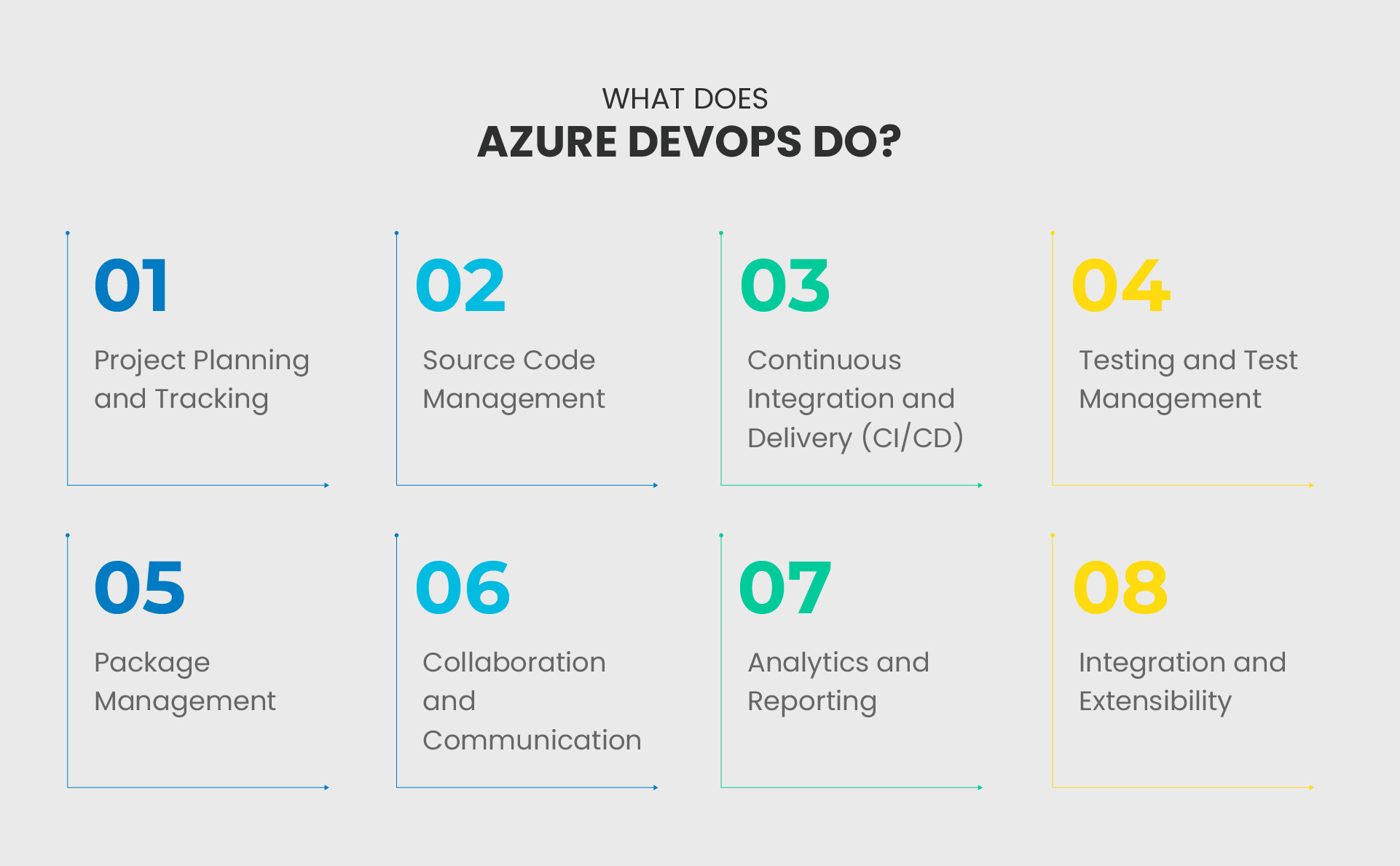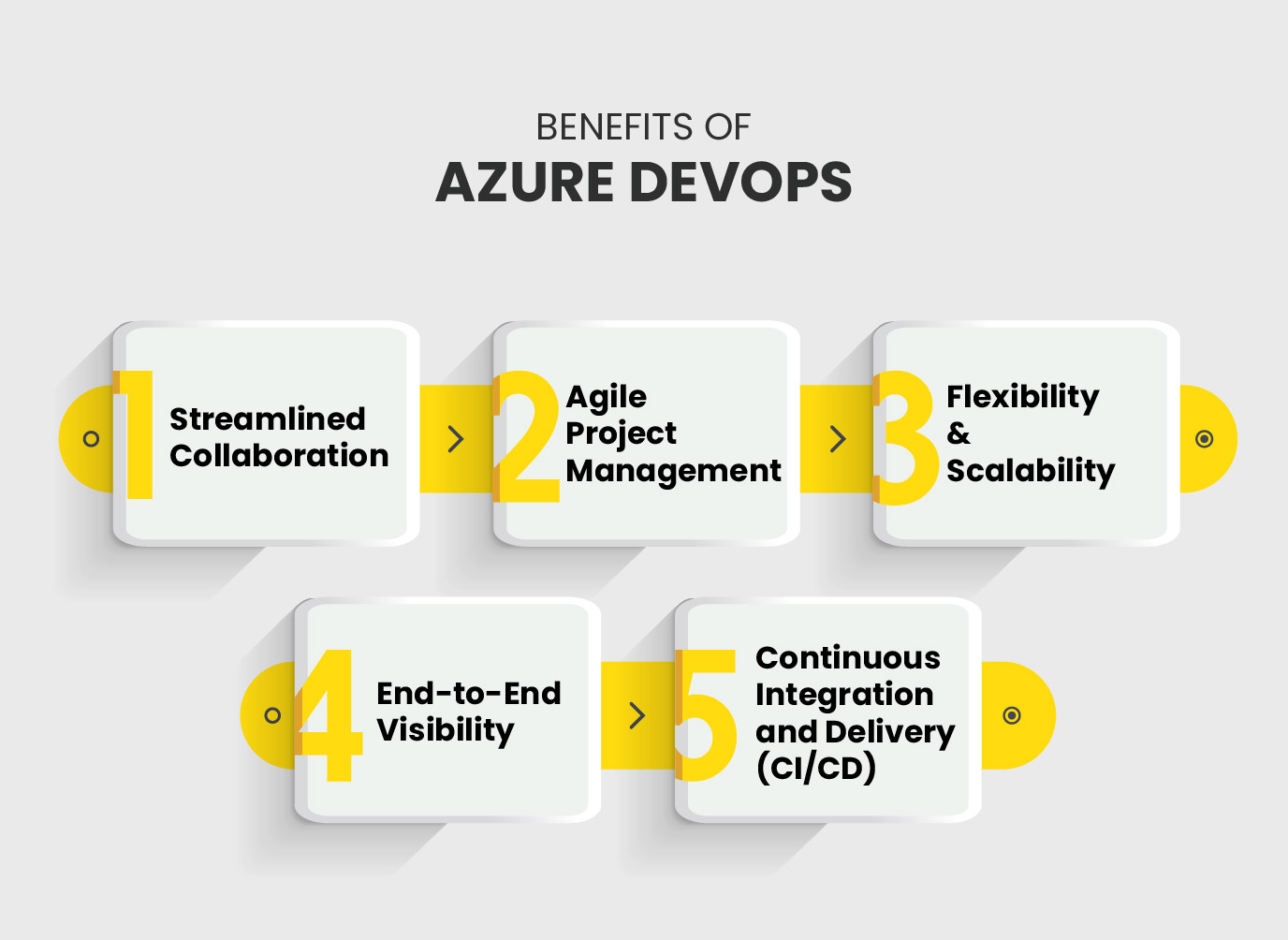Why Use DevOps On Azure?
DevOps is a methodology for developing software that unifies development (Dev) and operations (Ops) teams to improve collaboration, streamline processes, and speed up software delivery. Azure, Microsoft’s cloud computing platform, provides various services and features, making it an ideal setting for implementing DevOps techniques.

Organizations can leverage Azure’s robust infrastructure, integrated tools, and automated workflows to achieve faster deployment, continuous integration and delivery, scalability, and improved collaboration across development and operations teams. By adopting DevOps on Azure, businesses can effectively enhance their software development lifecycle, increase agility, and deliver high-quality applications to market more efficiently.
Table of Contents
What is Azure DevOps?
What does Azure DevOps Do?
Benefits of Azure DevOps
What is Azure DevOps?
Microsoft Azure is a Software as a Service (SaaS) platform that provides a comprehensive suite of DevOps tools for software creation and deployment. With its extensive capabilities and seamless integration with various market-leading tools, Azure DevOps is a compelling choice for coordinating DevOps services. Azure DevOps offers several advantages that contribute to efficient and effective software development and delivery processes.
What does Azure DevOps Do?
Azure DevOps is a robust platform that supports the software development life cycle with a broad range of capabilities. Here are some key things that Azure DevOps can do:

- Project Planning and Tracking: Azure DevOps provides tools like Azure Boards to plan, track, and manage work items, tasks, and user stories. It enables teams to organize and prioritize work, allocate resources, and monitor progress.
- Source Code Management: Azure Repos allows teams to host and version control their source code using Git or Team Foundation Version Control (TFVC). It provides features for branch management, code reviews, and collaboration among developers.
- Continuous Integration and Delivery (CI/CD): Azure Pipelines enables the automation of build, test, and deployment processes. Teams can create CI/CD pipelines that automatically build, test and deploy applications across different environments.
- Testing and Test Management: Azure Test Plans offer capabilities for test case management, test execution, and tracking test results. It permits teams to develop and manage test plans, execute tests, and monitor quality metrics.
- Package Management: Azure Artifacts provides a secure and scalable package management system. It allows teams to create, publish, and manage packages and artifacts used in their applications.
- Collaboration and Communication: Azure DevOps facilitates collaboration among team members with features like dashboards, boards, and wikis. It integrates with tools like Microsoft Teams for effective communication and knowledge sharing.
- Analytics and Reporting: Azure DevOps provides reporting and analytics capabilities to track project progress, code quality, and team performance. It offers insights and metrics that help teams make data-driven decisions and improve their processes.
- Integration and Extensibility: Azure DevOps integrates with various tools and services, both Microsoft and third-party, to extend its capabilities and integrate with existing workflows and systems.
Benefits of Azure DevOps
Azure DevOps offers several benefits that contribute to efficient and successful software development and delivery. Some key benefits of Azure DevOps are:

- Streamlined Collaboration: Azure DevOps provides a unified platform for teams to collaborate effectively. It enables seamless communication, shared workspaces, and real-time updates, promoting collaboration among developers, testers, and operations teams.
- Agile Project Management: Azure DevOps supports agile project management methodologies such as Scrum and Kanban. It offers features like backlog management, sprint planning, and customizable boards to facilitate agile planning and execution.
- Continuous Integration and Delivery (CI/CD): Azure DevOps automates the build, test, and deployment processes, enabling organizations to achieve continuous integration and delivery. By setting up CI/CD pipelines, teams can automate repetitive tasks, reduce manual errors, and accelerate the release of software updates.
- Flexibility and Scalability: Azure DevOps leverages the scalability and flexibility of the Microsoft Azure cloud platform. It allows teams to scale resources up or down based on demand, ensuring optimal performance during peak loads.
- End-to-End Visibility: Azure DevOps provides comprehensive visibility into the software development lifecycle. It offers dashboards, reports, and analytics that track key metrics, project progress, and code quality.
Azure DevOps with InfosecTrain
Azure DevOps offers the advantage of direct integration with open-source tools, enabling companies to obtain unique and custom tools tailored to their specific needs. By combining Azure’s infrastructure as code, continuous monitoring, and continuous integration capabilities with the Azure DevOps platform, organizations can access a comprehensive and tightly integrated package that fulfills all their requirements.
InfosecTrain is a prominent provider of IT and security training and consulting services. We offer Microsoft Azure DevOps Engineer training courses designed to enhance your knowledge and proficiency in the field of cloud computing. By learning from our experienced industry experts, you can gain the core skills required to excel in this rapidly growing profession.







 1800-843-7890 (India)
1800-843-7890 (India)